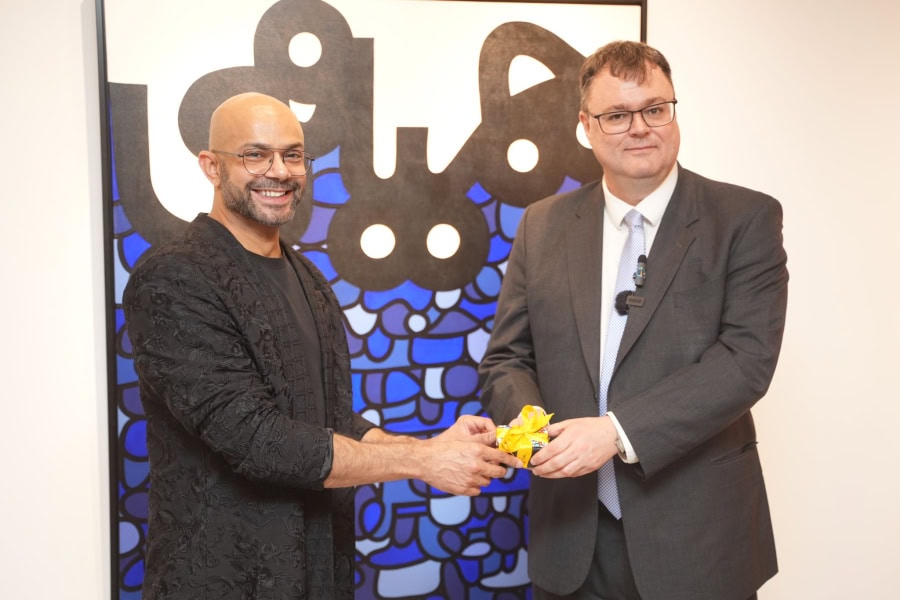LAHORE – In his most recent collection, self-taught maestro Ahmer Farooq of Pakistan has created a distinctive Urdu script to highlight the country’s numerous marginalized communities and tell the stories of its varied socio-cultural landscape.
Farooq’s work has been shown at exhibitions throughout the UAE, US, UK, and Europe.
Farooq, a former business graduate who now resides in Lahore, has made it his mission to tell the stories that he feels are frequently suppressed by Pakistan’s traditional society. Farooq’s descriptive style effectively conveys the “essence of resilience and defiance against the odds,” drawing from the perspectives of religious minorities, the transgender community, and vast segments of the populace living in poverty.
“Ahmer’s paintings appear to be bold and vibrant, but they actually have a lot of depth,” stated Noshi Qadir, the curator of the artist’s most recent exhibition at Tanzara Gallery in Islamabad, which was organized in association with the Norwegian Embassy.
“How he moves throughout the canvas’s geography, capturing the anguish, the victories, and the feelings of people and their sense of self. Thus, it’s really insightful and thought-provoking.
This time, Farooq’s work takes a different turn: in his capacity as the guardian of Pakistan’s marginalized, as he likes to call himself, and in order to maintain discretion regarding their very personal victories and setbacks, he has created a distinctive unique script in Urdu, the country’s official language.
“Looking at the canvas, you would notice that the text or information is not really readable,” Farooq remarked, gesturing to his vibrant canvases’ huge, stylized calligraphic alphabets.
This is done on purpose because, for instance, when you stand here and look at a person, all you would see is a person; however, you have no idea about their background or everything they are going through. This data is confidential in nature.
The artist explained that the reason for using a hidden new language was that the theme of his most recent collection was “the stories of marginalized communities” in Pakistan.
“And the marginalized communities can include anybody; they can include members of the transgender community as well as religious minority communities. It might be folks who, like you and me, don’t fit into a particular norm that society expects us to adhere to.
Inaugurated the Archipelago of the Self collection, Farooq’s “captivating” work examined the “complex interplay between personal and societal forces, expertly navigating the multifaceted nature of the Self,” according to Albert Ilsas, the Norwegian ambassador to Pakistan.
An archipelago is a chain, cluster, or collection of islands, or occasionally a sea with a few dispersed islands inside it. It is also referred to as an island group or island chain.
Farooq’s distinct artwork illuminates the fractured realities of underprivileged people by showing how they negotiate their public, private, and hidden identities. According to Farooq’s work, it is evident how emotionally taxed marginalized groups such as women, religious minorities, ethnic minorities, and other minorities are.
As to the ambassador, every brushstroke conveyed the “emotional turmoil and anxiety inherent in navigating a world where one’s identity is constantly scrutinized and judged.”
Ahmer claimed that his most recent collection was an invitation to support the “courage, resilience and hope of building bridges that reconnect all our islands.” He compared the Self to a collection of archipelagos, or a “scattering of isolated islands amidst the relentless ties of societal currents.”
The authenticity of Farooq’s artwork was commended by Jonathan Andre of the Swiss Embassy in Islamabad, who also underlined the ability of art to bridge divides and promote understanding.
He declared, “I think his art is very unique, very special, very authentic, and very original.” “And it’s wonderfulwonderful to see such a vibrant art scene in Pakistan, where art and culture blend so beautifully,”.










